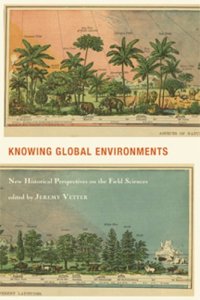
Ebook: Knowing Global Environments: New Historical Perspectives on the Field Sciences
Author: Jeremy Vetter (ed.)
- Tags: Environmental Science, Earth Sciences, Science & Math, History & Philosophy, Science & Math, Conservation, Energy, Nature & Ecology, Science & Math, Research, Science & Math, Environmentalism, Environment, Science & Math
- Series: Studies in Modern Science Technology and the Environment
- Year: 2010
- Publisher: Rutgers University Press
- Language: English
- pdf
Knowing Global Environments brings together nine leading scholars whose work spans a variety of environmental and field sciences, including archaeology, agriculture, botany, climatology, ecology, evolutionary biology, oceanography, ornithology, and tidology.
Collectively their essays explore the history of the field sciences, through the lens of place, practice, and the production of scientific knowledge, with a wide-ranging perspective extending outwards from the local to regional, national, imperial, and global scales. The book also shows what the history of the field sciences can contribute to environmental history-especially how knowledge in the field sciences has intersected with changing environments-and addresses key present-day problems related to sustainability, such as global climate, biodiversity, oceans, and more.
Contributors to Knowing Global Environments reveal how the field sciences have interacted with practical economic activities, such as forestry, agriculture, and tourism, as well as how the public has been involved in the field sciences, as field assistants, students, and local collaborators.
Collectively their essays explore the history of the field sciences, through the lens of place, practice, and the production of scientific knowledge, with a wide-ranging perspective extending outwards from the local to regional, national, imperial, and global scales. The book also shows what the history of the field sciences can contribute to environmental history-especially how knowledge in the field sciences has intersected with changing environments-and addresses key present-day problems related to sustainability, such as global climate, biodiversity, oceans, and more.
Contributors to Knowing Global Environments reveal how the field sciences have interacted with practical economic activities, such as forestry, agriculture, and tourism, as well as how the public has been involved in the field sciences, as field assistants, students, and local collaborators.
Download the book Knowing Global Environments: New Historical Perspectives on the Field Sciences for free or read online
Continue reading on any device:

Last viewed books
Related books
{related-news}
Comments (0)